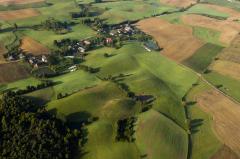Special Journal Issue Features Work of Nicholas Institute Researcher

FOR IMMEDIATE RELEASE: Wednesday, Feb. 13, 2013
CONTACT: Erin McKenzie
919-613-3652
erin.mckenzie@duke.edu
DURHAM, N.C. -- Feeding the world sustainably requires balancing a growing population's food and nutritional needs while limiting the greenhouse gases released by agriculture, a growing contributor to climate change.
In a new special issue of the journal Environmental Research Letters, Lydia Olander, Ecosystem Services Program director at Duke University's Nicholas Institute for Environmental Policy Solutions, and others tackle the topic. The journal issue explores the current state of greenhouse gas quantification methods, the potential for improving these methods and proposes new ideas for policy makers in developing countries. Olander served as a guest editor of the issue and author of one of the eight pieces in the edition, which is out this week:
-
Improving Field Measurements for Soil Carbon: The amount of carbon in soil is a key indicator of agricultural emissions. One study finds that remote sensing data, when calibrated to field data, can be used to estimate soil carbon on a landscape scale. This appears to be a significant improvement over current approaches when quantifying soil carbon on larger scales. This work could improve estimates of carbon storage, or sequestration, and lead to mitigation activities that are better targeted to geographic regions.
-
Improved Agricultural Greenhouse Gas Data Systems: One of the studies offers trends in greenhouse gas emissions from the agricultural sector and net deforestation using a new greenhouse gas database developed at the Food and Agriculture Organization (FAO) of the United Nations. It shows that agricultural emissions increased from 2000 to 2010, and emissions from agriculture have been consistently larger than those from net deforestation.
-
Investing in Agricultural Adaptation: Maintaining or enhancing food production is a key objective for many governments. Ensuring that agricultural production is resilient and well adapted to climate change is a key aspect of this. One study finds that broad-based efforts to adapt agriculture to climate change have mitigation co-benefits that are inexpensive relative to many activities whose main purpose is mitigation. The results challenge most existing climate financing portfolios, which support adaptation funds separately from mitigation ones.
-
Low-Cost Greenhouse Gas Quantification: This study outlines the available and affordable tools that monitor greenhouse gas emissions from agricultural wetlands. The authors suggest higher efficiency through use of low-cost quantification tools over more accurate ones due to high probability of failure when using the latter method.
This is the first set of articles in the special issue. Others will follow in the coming months as part of a series on improving quantification of agricultural greenhouse gases.
The special issue is sponsored by the CGIAR Research Program on Climate Change, Agriculture and Food Security and the Nicholas Institute, with support from the David and Lucille Packard Foundation and FAO.
All eight articles are now available online. To learn more about the project, visit http://nicholasinstitute.duke.edu/ecosystem/t-agg/international-project.
###

